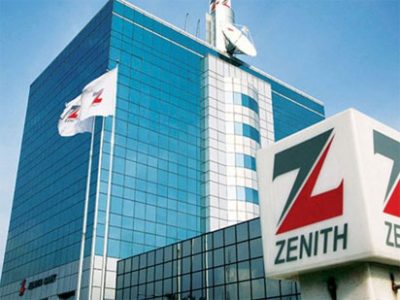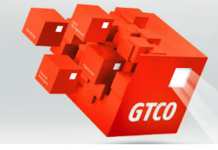One of Nigeria’s leading deposit money banks, Zenith Bank Plc, has declared the sum of N174billion as gross profit-before-tax (PBT) for the year ended 2017. Its total assets also increased to N4.83trillion within the same period.
The N174billion PBT is higher than the N140billion recorded as PBT in 2016, which shows that its profit rose by 24 percent in the year under review.
Similarly, the bank’s profit-after-tax in the turbulent 2017 financial year for all sectors of the nation’s economy increased by 32 percent, from N119 billion in 2016 to N157 billion in 2017.
The bank declared at its 27th annual general meeting (AGM) held in Abuja, yesterday, that its total deposits received within the year ended December 31, 2017 stood at N2.74trillion, representing an eight per cent increase over the previous year’s figure of N2.55trillion.
During the same period, the total assets of the bank grew from N4.28trillion to N4.83trillion, representing 13 per cent increase. On the other hand, Zenith Bank’s shareholders’ fund also rose from N616billion in 2016 to N708billion in 2017, representing an increase of 15 per cent.
The bank also posted positive gross earnings within the same year. For example, its gross earnings grew by 48 per cent from N455billion in 2016 to N674billion in 2017, showing strength over its rivals.
Chairman of the Zenith Bank Group, Mr. Jim Ovia, told shareholders at the meeting that said Zenith Bank was committed to delivering superior returns to them.
He said that in clear demonstration of this, the financial institution’s management had declared and paid them an interim dividend of 25kobo per share in the course of the 2017 financial year.
After short deliberations on the report of the bank, the shareholders unanimously approved, with a vote of no objection, for the sharing of final dividend of 245 kobo per share that was proposed by the board.
The amount that was approved brings the total dividend for the year ended to 270 kobo per share as against 202 kobo per share that was paid the previous year. As a group, the performance indices were no less impressive.
The group’s profit-before-tax grew by 30 per cent, from N157billion in 2016 to 203billion in 2017. Profit-after-tax also grew from N130billion in 2018 to N178billion in 2017, representing 37 per cent growth rate.
The group’s total assets also rose by 18 per cent, representing the growth from N4.74trillion to N5.60trillion in 2016 and 2017 respectively, while customers’ deposit rose by 15 per cent during the same period from N2.98trillion in 2016 to N3.44trillion in the succeeding year, with shareholders’ funds rising from N704billion in 2016 to N822billion in 2017. Ovia announced that “as a leader in the digital space, with an unwavering determination for raising benchmarks and setting the pace in financial technology, we have invested immensely in new technologies and digital solutions” in the last financial year.
The goal, especially for the Fourth Industrial Revolution (4IR), in Africa, Ovia said, is “to continually create innovative solutions that ensure convenience, speed and safety of transactions for our teeming customers.
“In clear demonstration of our commitment to the ideals and tenets of corporate sustainability and responsibility principles, hinged on the triple bottom line of people, planet and profit, the bank, in the course of the year, made donations towards the setting up of ICT centres in several educational institutions across the country,” he added.
The group managing director/chief executive officer, Mr. Peter Amangbo said, “Central of what we stand for is a steadfast commitment to continually delight our customers.”
Shareholders expressed delight at the resilience and innovative capacity of the management of the bank to come out with outstanding results in 2017 when Nigeria’s economy was neck deep in recession.
Meanwhile, the bank recorded no punishable infraction in its operations throughout the 2017 financial year, an analysis of the bank’s financial statement for the year ending December 2017 has shown.
This disclosure is contained in the bank’s financial returns submitted to the Nigerian Stock Exchange, NSE. The bank, according to details of its compliance with banking regulations, noted that during the year, there were no contraventions of the regulation of the Banks and Other Financial Institutions Act, 1991. It added that there were no events after the reporting period requiring special disclosure.















